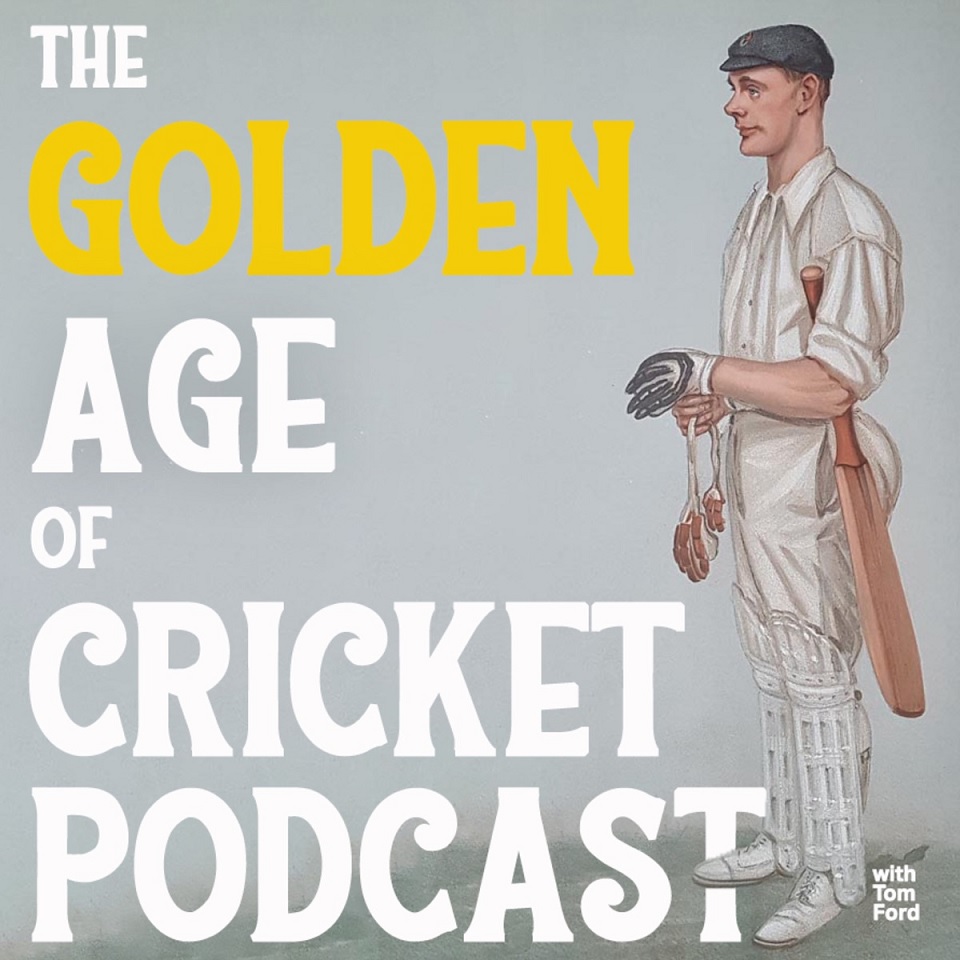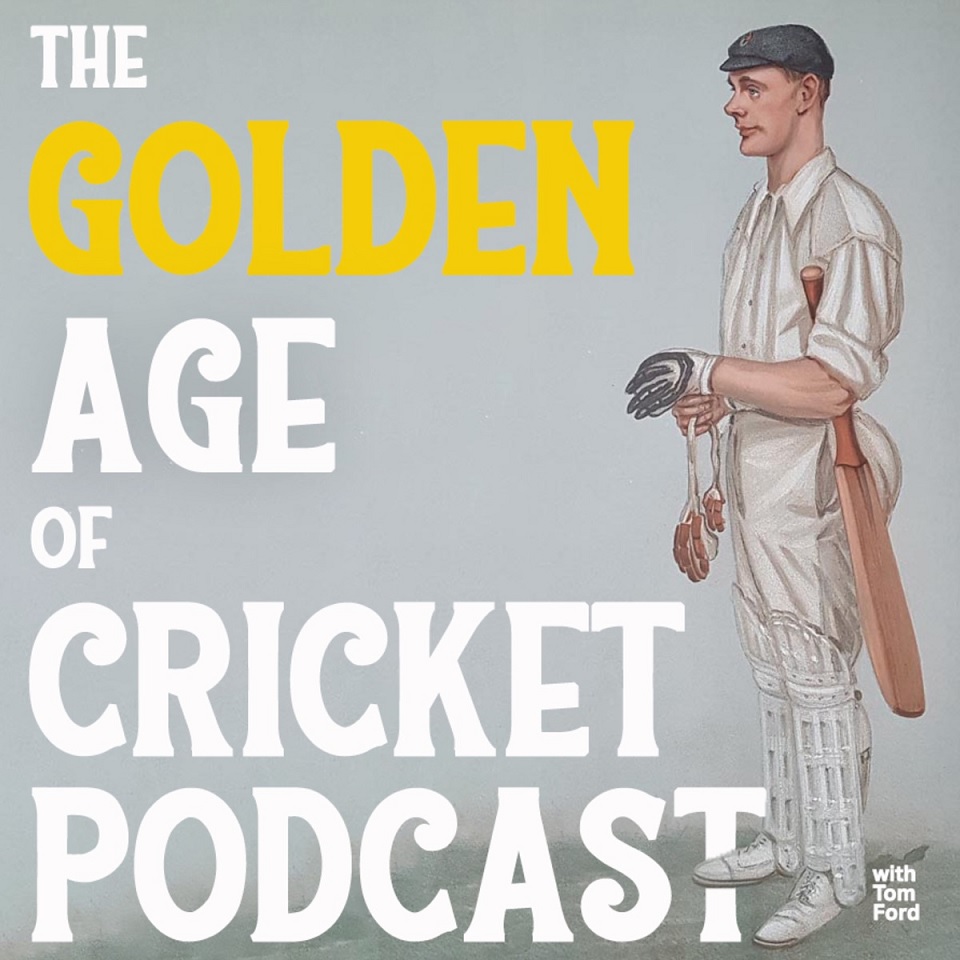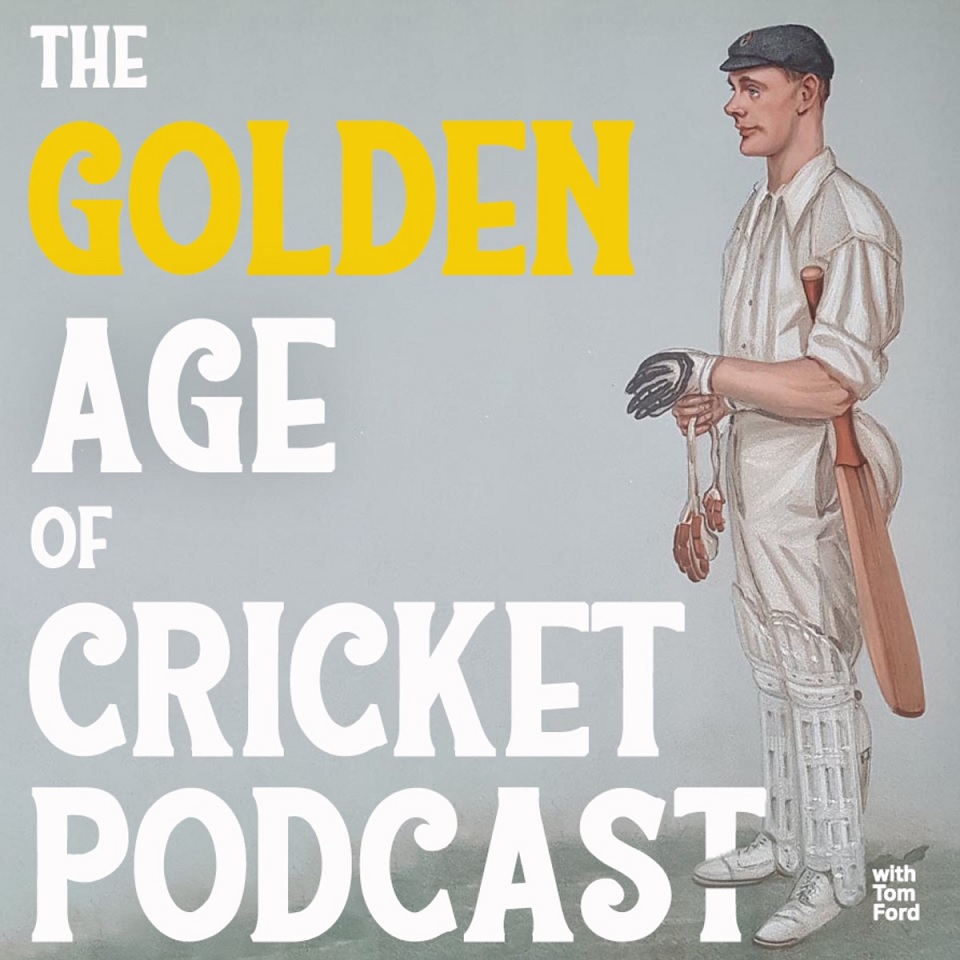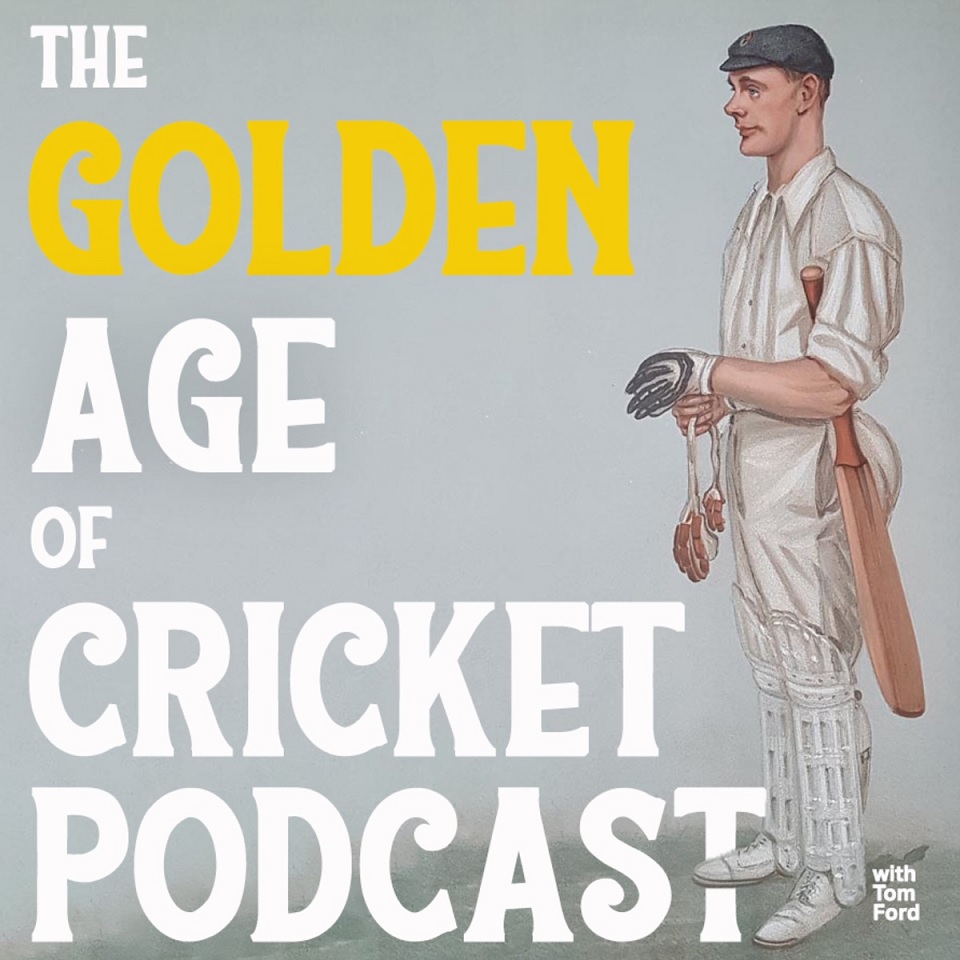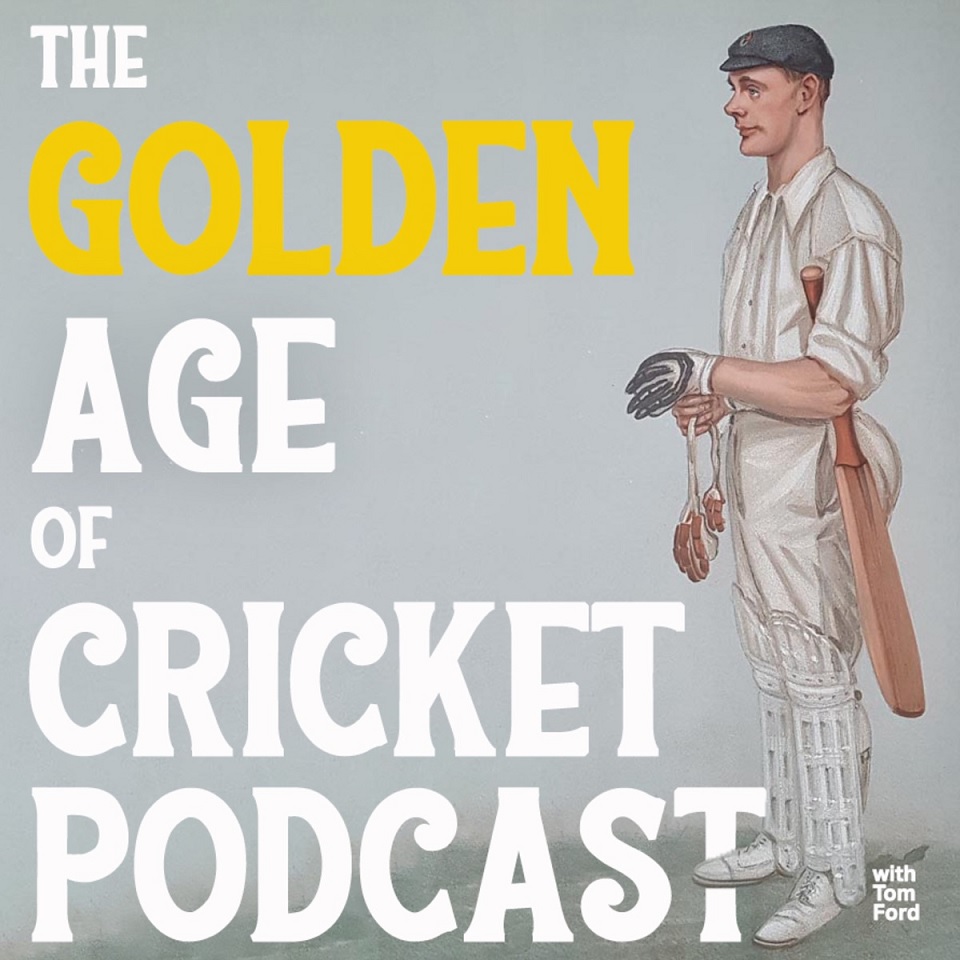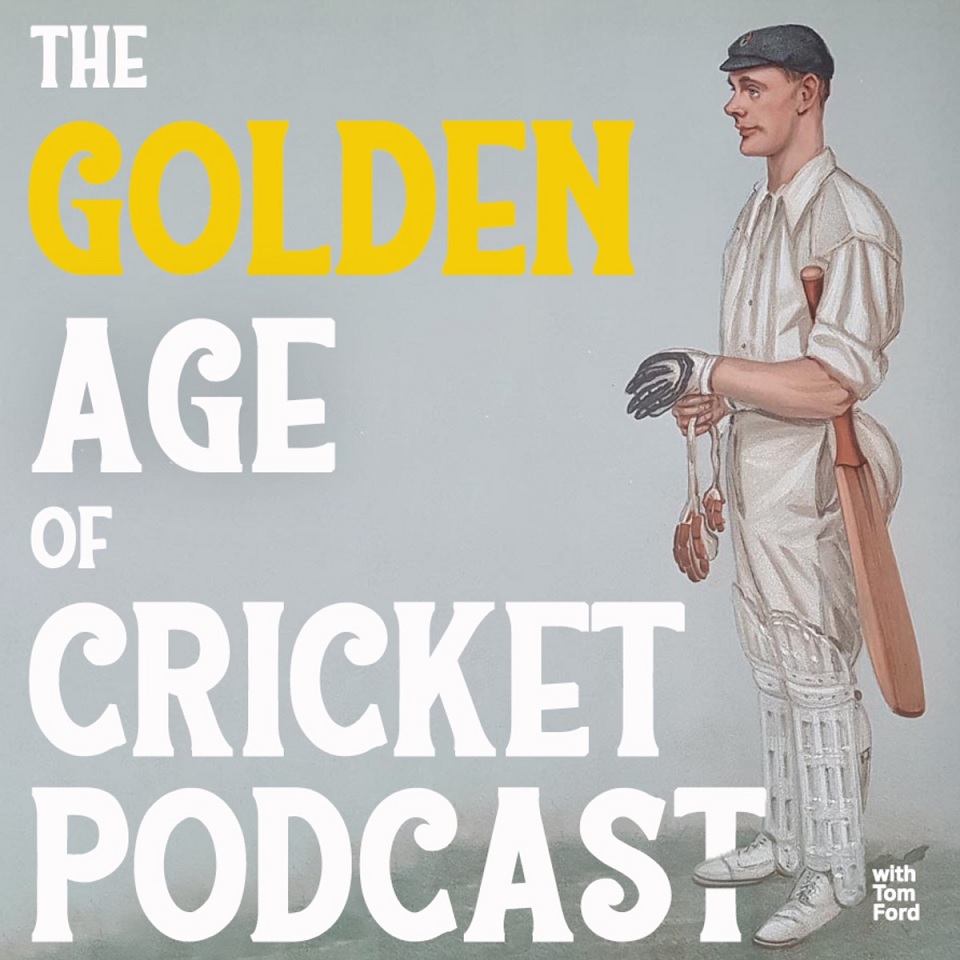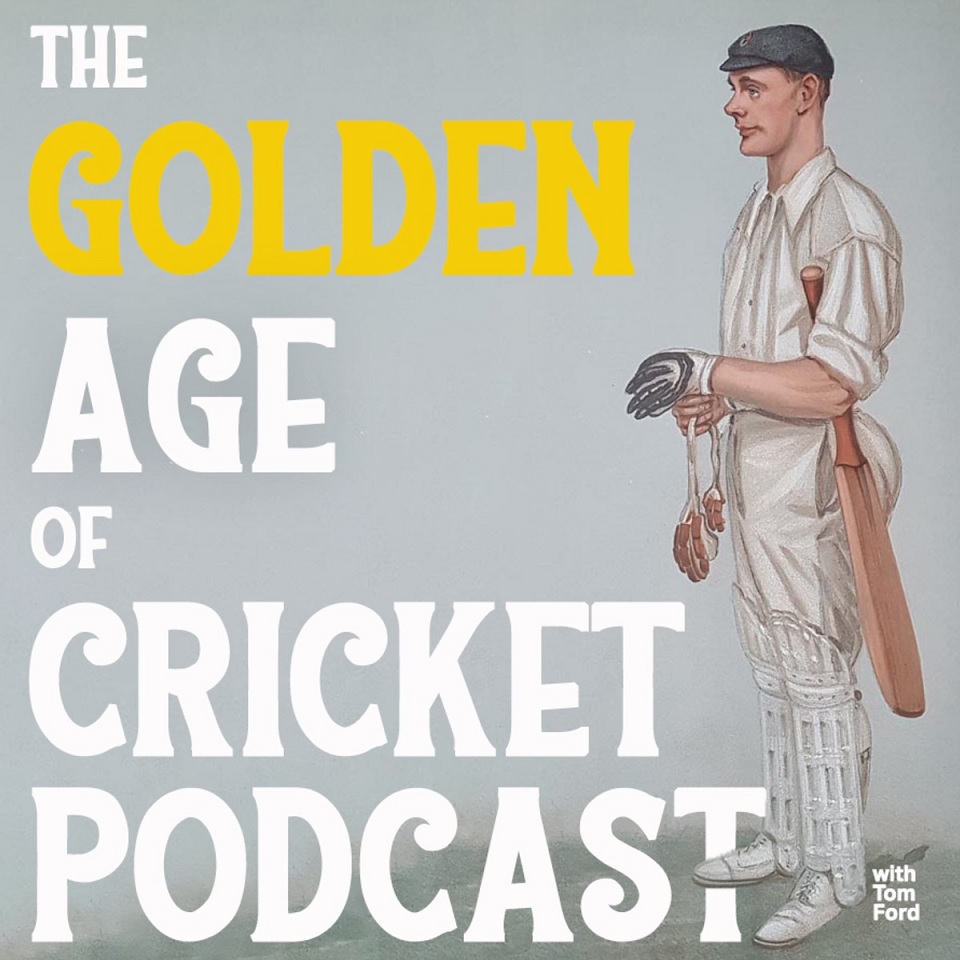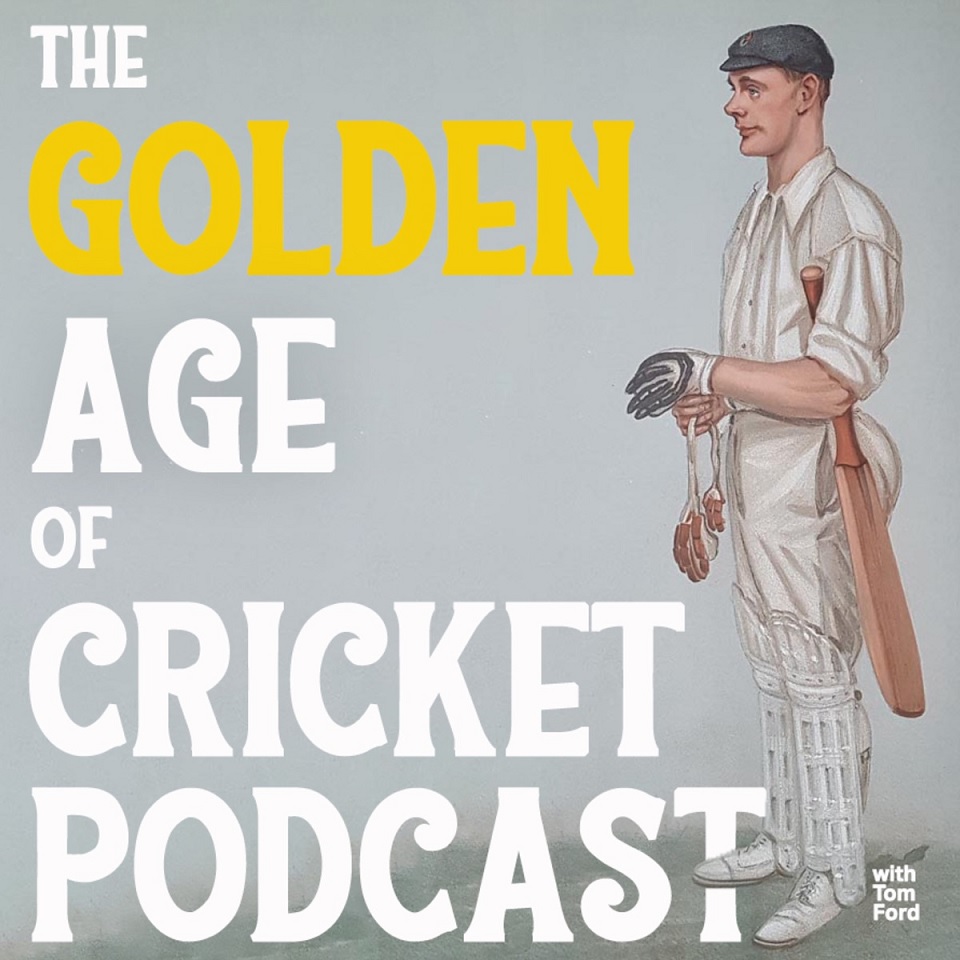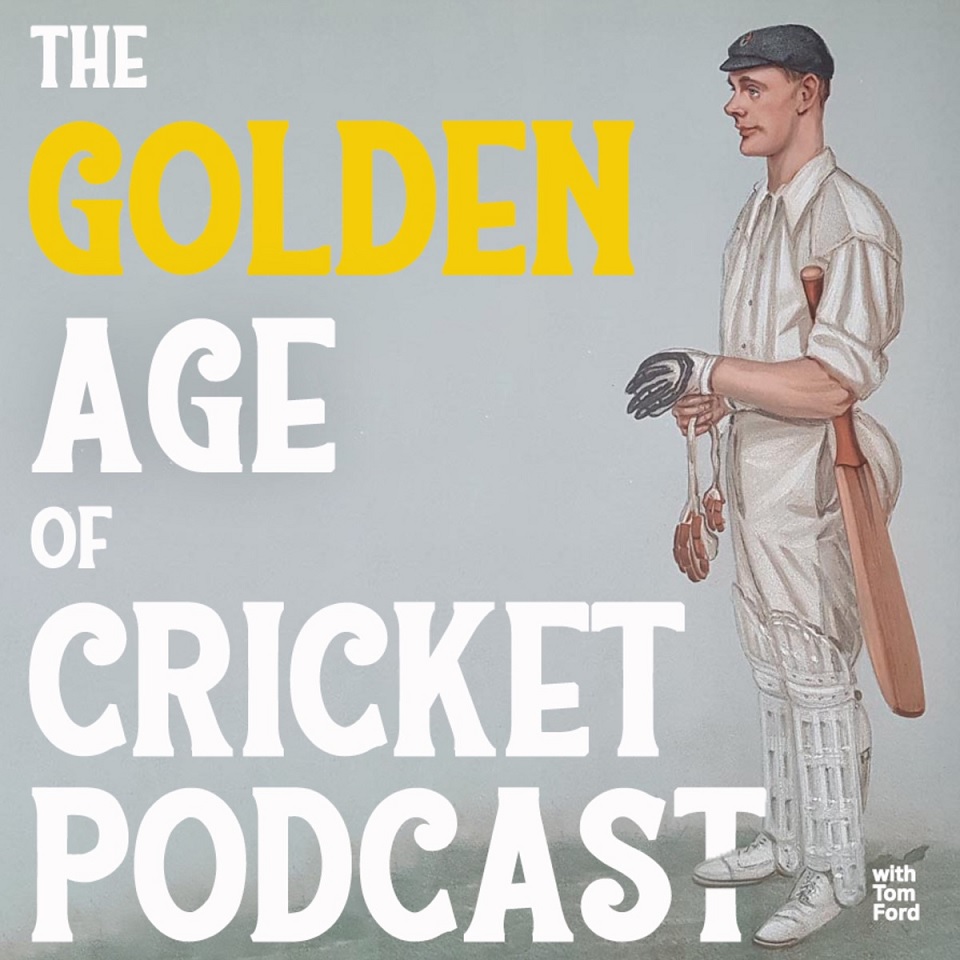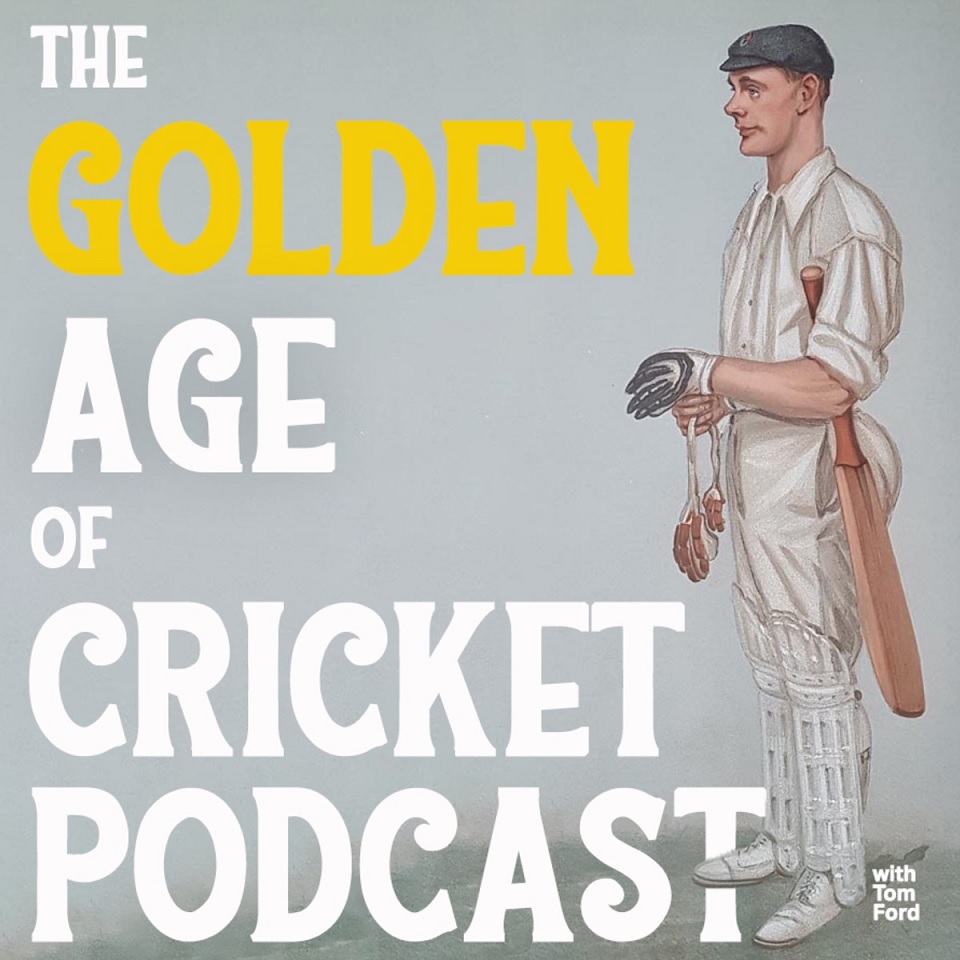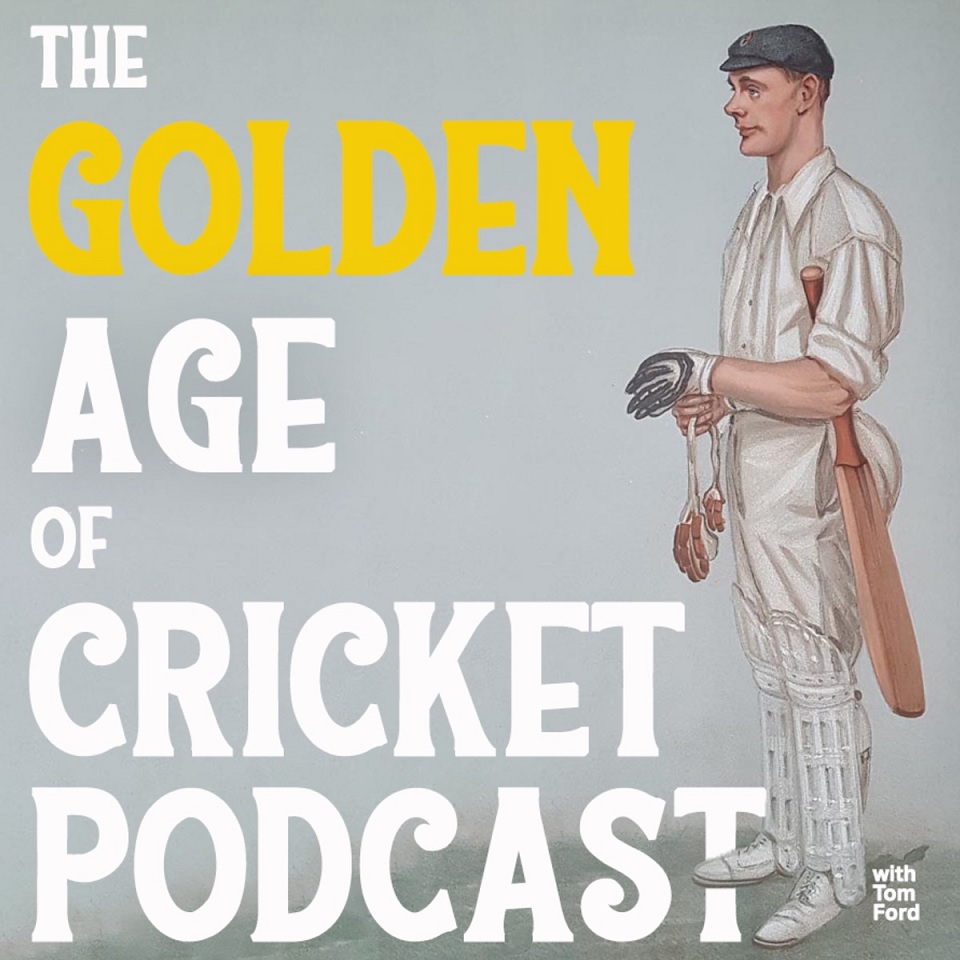About Me
The Golden Age of Cricket Podcast
London, United Kingdom
The 'Golden Age of Cricket’ is a podcast which explores one of the most fascinating eras in the history of the game. Loosely defined as the twenty-five years immediately preceding the outbreak of the First World War, the so called ‘Golden Age’ (1890—1914) saw some of the most legendary cricketers of all time: WG Grace, Victor Trumper, CB Fry, Monty Noble, Wilfred Rhodes, Warwick Armstrong, KS Ranjitsinhji, Hugh Trumble, Sydney Barnes, Archie MacLaren, Clem Hill, Gilbert Jessop and many, many more. Join me, Tom Ford, as each episode I invite a guest to discuss a player, series or event from the Golden Age, in an attempt to resurrect this often forgotten chapter of cricket history. This is the antithesis of most cricket podcasts which focus on the modern game and is for anyone interested in learning a little more about one of cricket’s most fascinating periods. Save or subscribe to the podcast now so you’ll never miss an episode
Partner Sponsors
My Activity
question
Q: This photo has the accompanying description:
"Captain AB Nicholas of the Harrison Line's SS Inanda (left) hands the "Victor Trumper" bat, which has been signed by all touring cricket teams since 1902, to MCC Captain Freddie Calthorpe who is invited to add his signature, circa December 1925."
While I'm happy the description might be wrong (as far as I'm aware Calthorpe only lead one international tour and that was to the Caribbean in 1929-30; he only played a total of 4 Test matches), does anyone have more information about this 'Trumper' bat and the significance behind it?
Check out The Golden Age of Cricket Podcasts -
"Captain AB Nicholas of the Harrison Line's SS Inanda (left) hands the "Victor Trumper" bat, which has been signed by all touring cricket teams since 1902, to MCC Captain Freddie Calthorpe who is invited to add his signature, circa December 1925."
While I'm happy the description might be wrong (as far as I'm aware Calthorpe only lead one international tour and that was to the Caribbean in 1929-30; he only played a total of 4 Test matches), does anyone have more information about this 'Trumper' bat and the significance behind it?
Check out The Golden Age of Cricket Podcasts -
https://open.spotify.com/show/5SfiBCn7tdi33bGbhbR7te
question
Q: Bill Murdoch – Part 2 – Richard Cassman and Ric Sissons
In Part 2 of this episode on Australian cricket legend Billy Murdoch, Tom and Murdoch's biographers, Richard Cashman and Ric Sissons, discuss his captaincy tactics, his friendship with WG Grace, his legacy and delayed inclusion in the Australian Cricket Hall of Fame.
Richard Cashman is a sports historian based at the University of Technology Sydney. He is the author of 12 cricket books as well as his memoirs, Cackyhander: Writing on Cricket, Sports History and the Olympic Games. He has won the Australian Cricket Society Literary Award on three occasions: for his book on Australian cricket crowds, and his biographies of Fred Spofforth & Billy Murdoch, the latter co-written with my other guest.
Ric Sissons grew up in England, playing and watching cricket in Derbyshire. He is the author of eleven cricket books including The Players, which won the English Cricket Society’s Silver Jubilee Literary Award in 1988. His most recent books are: The Glory & The Dream: The 1903-04 MCC Tour of Australia and the so-called Golden Age; J T Tyldesley in Australia; And – with Peter Schofield – When the Kangaroo met the Eagle. The 1913 Australian tour of Canada and the United States.
In Part 2 of this episode on Australian cricket legend Billy Murdoch, Tom and Murdoch's biographers, Richard Cashman and Ric Sissons, discuss his captaincy tactics, his friendship with WG Grace, his legacy and delayed inclusion in the Australian Cricket Hall of Fame.
Richard Cashman is a sports historian based at the University of Technology Sydney. He is the author of 12 cricket books as well as his memoirs, Cackyhander: Writing on Cricket, Sports History and the Olympic Games. He has won the Australian Cricket Society Literary Award on three occasions: for his book on Australian cricket crowds, and his biographies of Fred Spofforth & Billy Murdoch, the latter co-written with my other guest.
Ric Sissons grew up in England, playing and watching cricket in Derbyshire. He is the author of eleven cricket books including The Players, which won the English Cricket Society’s Silver Jubilee Literary Award in 1988. His most recent books are: The Glory & The Dream: The 1903-04 MCC Tour of Australia and the so-called Golden Age; J T Tyldesley in Australia; And – with Peter Schofield – When the Kangaroo met the Eagle. The 1913 Australian tour of Canada and the United States.
https://open.spotify.com/episode/0Oa8n5QYaMKyCVTdo5mdzu
question
Q: Bill Murdoch – Part 1 – Richard Cassman and Ric Sissons
Billy Murdoch was a colossus of Australian cricket in the 19th century. He captained Australia in its first victory on English soil giving rise to the Ashes, and as a stylish but determined batsman, he scored the first triple century in Australia and the first Test double century. He’s often been called Australia’s answer to W.G. Grace. But he courted controversy too. Bankrupted in his 20s, he secretly married the daughter of Victoria’s wealthiest gold miner without his permission. He emigrated to England in 1890, as he and his wife aspired to make it in Edwardian society, often living beyond their means. He even played a solitary Test for England in South Africa. But what do we make of Murdoch’s cricketing legacy today, and is he unfairly forgotten?
In this episode, we look at the backend of Murdoch's life & career as it falls within the 'Golden Age', and for the first time on this podcast I welcome two guests to discuss a subject:
Richard Cashman is a sports historian based at the University of Technology Sydney. He is the author of 12 cricket books as well as his memoirs, Cackyhander: Writing on Cricket, Sports History and the Olympic Games. He has won the Australian Cricket Society Literary Award on three occasions: for his book on Australian cricket crowds, and his biographies of Fred Spofforth & Billy Murdoch, the latter co-written with my other guest.
Ric Sissons grew up in England, playing and watching cricket in Derbyshire. He is the author of eleven cricket books including The Players, which won the English Cricket Society’s Silver Jubilee Literary Award in 1988. His most recent books are: The Glory & The Dream: The 1903-04 MCC Tour of Australia and the so-called Golden Age; J T Tyldesley in Australia; And – with Peter Schofield – When the Kangaroo met the Eagle. The 1913 Australian tour of Canada and the United States.
Billy Murdoch was a colossus of Australian cricket in the 19th century. He captained Australia in its first victory on English soil giving rise to the Ashes, and as a stylish but determined batsman, he scored the first triple century in Australia and the first Test double century. He’s often been called Australia’s answer to W.G. Grace. But he courted controversy too. Bankrupted in his 20s, he secretly married the daughter of Victoria’s wealthiest gold miner without his permission. He emigrated to England in 1890, as he and his wife aspired to make it in Edwardian society, often living beyond their means. He even played a solitary Test for England in South Africa. But what do we make of Murdoch’s cricketing legacy today, and is he unfairly forgotten?
In this episode, we look at the backend of Murdoch's life & career as it falls within the 'Golden Age', and for the first time on this podcast I welcome two guests to discuss a subject:
Richard Cashman is a sports historian based at the University of Technology Sydney. He is the author of 12 cricket books as well as his memoirs, Cackyhander: Writing on Cricket, Sports History and the Olympic Games. He has won the Australian Cricket Society Literary Award on three occasions: for his book on Australian cricket crowds, and his biographies of Fred Spofforth & Billy Murdoch, the latter co-written with my other guest.
Ric Sissons grew up in England, playing and watching cricket in Derbyshire. He is the author of eleven cricket books including The Players, which won the English Cricket Society’s Silver Jubilee Literary Award in 1988. His most recent books are: The Glory & The Dream: The 1903-04 MCC Tour of Australia and the so-called Golden Age; J T Tyldesley in Australia; And – with Peter Schofield – When the Kangaroo met the Eagle. The 1913 Australian tour of Canada and the United States.
https://open.spotify.com/episode/5uPCBgOgkZLkVEZ7T5tNuH
question
Q: The first in a new mini-series of episodes of The Golden Age of Cricket Podcast is now available, dissecting what many consider the first great Test match of the Golden Age: The 1st Test of the 1894-95 Ashes Series at the SCG.
Listen for free on Apple Podcasts here:
Listen for free on Apple Podcasts here:
https://podcasts.apple.com/au/podcast/the-golden-age-of-cricket-podcast/id1667094534
question
Q: 'Tibby' Cotter – Part 2 – Max Bonnell
In Part 2, Max discusses Tibby's prowess as a batsman, his involvement in the infamous 'Big Six' dispute of 1912, his career as a stretcher bearer in the First World War, and the mystery surrounding his death at the Battle of Beersheba in October 1917.
ABOUT MAX BONNELL:
Max is a lawyer and writer from Sydney. He has published around 20 books on sports history and legal topics. He played grade cricket for about 20 years for Western Suburbs and Sydney University, plus a season in the Birmingham League. Max is a life member of the Sydney University Cricket Club and the Sydney Cricket Association. In 2012, Max co-authored (with Andrew Sproul) a biography on today’s subject, titled: Tibby Cotter: Fast Bowler, Larrikin, Anzac.
CREDITS:
Presenter & Producer: Tom Ford
In Part 2, Max discusses Tibby's prowess as a batsman, his involvement in the infamous 'Big Six' dispute of 1912, his career as a stretcher bearer in the First World War, and the mystery surrounding his death at the Battle of Beersheba in October 1917.
ABOUT MAX BONNELL:
Max is a lawyer and writer from Sydney. He has published around 20 books on sports history and legal topics. He played grade cricket for about 20 years for Western Suburbs and Sydney University, plus a season in the Birmingham League. Max is a life member of the Sydney University Cricket Club and the Sydney Cricket Association. In 2012, Max co-authored (with Andrew Sproul) a biography on today’s subject, titled: Tibby Cotter: Fast Bowler, Larrikin, Anzac.
CREDITS:
Presenter & Producer: Tom Ford
https://open.spotify.com/episode/0rxqDGEuhskCq0Z7izdUbd?si=l1B-JB97QRC3Phh6qAaacw
question
Q: 'Tibby' Cotter – Part 1 – Max Bonnell
If cricket fans know one thing about Albert 'Tibby' Cotter, it's likely to be that he was the only Australian Test cricketer to have died in combat during the First World War. But as his biographer Max Bonnell explains, there was much more to the life and career of the Australian fast bowler. In Part 1, Max details Tibby's early life, his rise to international fame, his habit of bowling short-pitched deliveries to the English, and his rather unorthodox bowling action.
ABOUT MAX BONNELL:
Max is a lawyer and writer from Sydney. He has published around 20 books on sports history and legal topics. He played grade cricket for about 20 years for Western Suburbs and Sydney University, plus a season in the Birmingham League. Max is a life member of the Sydney University Cricket Club and the Sydney Cricket Association. In 2012, Max co-authored (with Andrew Sproul) a biography on today’s subject, titled: Tibby Cotter: Fast Bowler, Larrikin, Anzac.
CREDITS:
Presenter & Producer: Tom Ford
If cricket fans know one thing about Albert 'Tibby' Cotter, it's likely to be that he was the only Australian Test cricketer to have died in combat during the First World War. But as his biographer Max Bonnell explains, there was much more to the life and career of the Australian fast bowler. In Part 1, Max details Tibby's early life, his rise to international fame, his habit of bowling short-pitched deliveries to the English, and his rather unorthodox bowling action.
ABOUT MAX BONNELL:
Max is a lawyer and writer from Sydney. He has published around 20 books on sports history and legal topics. He played grade cricket for about 20 years for Western Suburbs and Sydney University, plus a season in the Birmingham League. Max is a life member of the Sydney University Cricket Club and the Sydney Cricket Association. In 2012, Max co-authored (with Andrew Sproul) a biography on today’s subject, titled: Tibby Cotter: Fast Bowler, Larrikin, Anzac.
CREDITS:
Presenter & Producer: Tom Ford
https://open.spotify.com/episode/4Wuo23FYCpajUlkIbEoqdT?si=HdntSNUVQca47zZjkD2FWg&nd=1
question
Q: Cricket correspondent for The Sunday Times, Simon Wilde, joins the podcast to discuss the life and career of the so-called 'Father of Indian Cricket' – K.S. Ranjitsinhji. Born in India in 1872, 'Ranji' – as he was universally known – arrived in England in 1888 to further his education but took the cricket world by storm with his unorthodox but highly effective batting style. At the height of his success, he was as famous as W.G. Grace. But despite his 'magical' ability in the eyes of the British, he was plagued by many off-field issues throughout his cricket career, including financial complications and fighting for his right to become the princely ruler of a state in India.
https://www.cricconnect.com/profile/1009/the-golden-age-of-cricket-podcast/blog/1183/ranji-part-1-with-simon-wilde
blog post
In the second part of my chat with The Sunday Times cricket correspondent, Simon Wilde, we discuss Ranjitsinhji's batting style and how he changed the appearance of 'batsmanship', the fluctuating f ...
blog post
Cricket correspondent for The Sunday Times, Simon Wilde, joins the podcast to discuss the life and career of the so-called 'Father of Indian Cricket' – K.S. Ranjitsinhji. Born in India in 1872, ' ...
question
Q: Warwick Armstrong - Part 1 with Gideon Haigh
Leading cricket writer Gideon Haigh joins the podcast. When it comes to giants of Australian cricket, there are few who stand larger than Warwick Armstrong. Described as the ‘WG Grace of the Antipodes’, he was an all-round phenomenon, who’s stature in cricket - both physically and figuratively - has rarely been surpassed. Emerging in the first years of the 20th century, he defied many of the game’s oldest laws and customs, played cricket to win regardless of its spirit, and stood firm against an emerging dictatorial cricket Establishment. When he retired after leading the all-conquering 1921 Australians in England, he was universally praised as a ‘champion of the game’. But it’s his early years as a lanky, defiant allrounder in the Golden Age of Cricket which concerns this podcast.
Leading cricket writer Gideon Haigh joins the podcast. When it comes to giants of Australian cricket, there are few who stand larger than Warwick Armstrong. Described as the ‘WG Grace of the Antipodes’, he was an all-round phenomenon, who’s stature in cricket - both physically and figuratively - has rarely been surpassed. Emerging in the first years of the 20th century, he defied many of the game’s oldest laws and customs, played cricket to win regardless of its spirit, and stood firm against an emerging dictatorial cricket Establishment. When he retired after leading the all-conquering 1921 Australians in England, he was universally praised as a ‘champion of the game’. But it’s his early years as a lanky, defiant allrounder in the Golden Age of Cricket which concerns this podcast.
https://www.cricconnect.com/profile/1009/the-golden-age-of-cricket-podcast/blog/1110/warwick-armstrong-part-1-with-gideon-haigh
question
Q: C.B. Fry - Part 1 with Iain Wilton
There are few cricketers from the Golden Age who remain such an enigma as C. B. Fry. Captain of the England cricket team, footballer, world-record long jump holder, classicist, politician, naval captain, novelist, journalist, academic - there was no end to his talent. He even came close to becoming the King of Albania. English commentator John Arlott described him as 'probably the most variously gifted Englishman of any age.' On more than one occasion during his playing career, he was the undisputed best batsman in the world; yet he never toured Australia as a player, had questionable ties to some senior figures in Nazi Germany, and was troubled throughout his life by mental health issues, probably ignited by a less than ideal domestic setting. In Part 1, Tom is joined by biographer Iain Wilton, and they discuss Fry’s early life, his writing and batting style, and his relationship with his wife, Beatrice.
There are few cricketers from the Golden Age who remain such an enigma as C. B. Fry. Captain of the England cricket team, footballer, world-record long jump holder, classicist, politician, naval captain, novelist, journalist, academic - there was no end to his talent. He even came close to becoming the King of Albania. English commentator John Arlott described him as 'probably the most variously gifted Englishman of any age.' On more than one occasion during his playing career, he was the undisputed best batsman in the world; yet he never toured Australia as a player, had questionable ties to some senior figures in Nazi Germany, and was troubled throughout his life by mental health issues, probably ignited by a less than ideal domestic setting. In Part 1, Tom is joined by biographer Iain Wilton, and they discuss Fry’s early life, his writing and batting style, and his relationship with his wife, Beatrice.
https://www.cricconnect.com/profile/1009/the-golden-age-of-cricket-podcast/blog/1108/cb-fry-part-1-with-iain-wilton
question
Q: Wilfred Rhodes - Part 2 with Patrick Ferriday
Part 2 of our discussion on the life and career of cricket colossus Wilfred Rhodes (1877–1973). This episode dissects his transition from bowler to batsman (and then back to bowler), his domestic life, his famous return to the Test side for the final match of the 1926 Ashes series, and his retirement years.
Part 2 of our discussion on the life and career of cricket colossus Wilfred Rhodes (1877–1973). This episode dissects his transition from bowler to batsman (and then back to bowler), his domestic life, his famous return to the Test side for the final match of the 1926 Ashes series, and his retirement years.
https://www.cricconnect.com/profile/1009/the-golden-age-of-cricket-podcast/blog/1107/wilfred-rhodes-part-2-with-patrick-ferriday
question
Q: Wilfred Rhodes - Part 1 with Patrick Ferriday
Records are made to be broken, but in all likelihood, those belonging to Wilfred Rhodes (1877–1973) will stand for eternity. His 4204 wickets across 1110 First-Class matches must be incomprehensible to modern cricketers, who split their time and effort across multiple formats. He played his first Test in 1899 alongside WG Grace and his last in 1930 at a time when Bradman was taking all before him. At 52 years & 165 days, he still holds the record for being the oldest person to play a Test Match. But his career was much more than just longevity and gigantic numbers.
Records are made to be broken, but in all likelihood, those belonging to Wilfred Rhodes (1877–1973) will stand for eternity. His 4204 wickets across 1110 First-Class matches must be incomprehensible to modern cricketers, who split their time and effort across multiple formats. He played his first Test in 1899 alongside WG Grace and his last in 1930 at a time when Bradman was taking all before him. At 52 years & 165 days, he still holds the record for being the oldest person to play a Test Match. But his career was much more than just longevity and gigantic numbers.
https://www.cricconnect.com/profile/1009/the-golden-age-of-cricket-podcast/blog/1106/wilfred-rhodes-part-1-with-patrick-ferriday
question
Q: Monty Noble - Part 2 with Peter Lloyd
To mark his sesquicentenary (28 January 2023), we release Part 2 of this episode on the life and career of Montague Alfred Noble (1873–1940), middle-order batsman, early exponent of swerve bowling, and Australia’s twelfth Test captain. Once again, biographer Peter Lloyd joins host Tom Ford to discusses Monty's life and career, including Noble’s qualities as a captain, his relationship with cricket crowds, the SCG Grandstand named in his honour and his legacy today. Furthermore, we dissect Noble’s Test, First Class and Grade statistics in detail. Peter’s self-published Limited Edition book Monty Noble: Cricketing Nobility (2022) was much sought after. Good luck finding a copy!
To mark his sesquicentenary (28 January 2023), we release Part 2 of this episode on the life and career of Montague Alfred Noble (1873–1940), middle-order batsman, early exponent of swerve bowling, and Australia’s twelfth Test captain. Once again, biographer Peter Lloyd joins host Tom Ford to discusses Monty's life and career, including Noble’s qualities as a captain, his relationship with cricket crowds, the SCG Grandstand named in his honour and his legacy today. Furthermore, we dissect Noble’s Test, First Class and Grade statistics in detail. Peter’s self-published Limited Edition book Monty Noble: Cricketing Nobility (2022) was much sought after. Good luck finding a copy!
https://www.cricconnect.com/profile/1009/the-golden-age-of-cricket-podcast/blog/1105/monty-noble-part-2-with-peter-lloyd
question
Q: Monty Noble - Part 1 with Peter Lloyd
To mark his 150th birthday (28 January 2023), we launch the podcast with a double episode on the life and career of Montague Alfred Noble (1873–1940), middle-order batsman, early exponent of swerve bowling, and Australia’s twelfth Test captain. For this episode, biographer Peter Lloyd joins host Tom Ford to discusses the challenges he faced writing the first full-length account of Noble’s life, his early cricket career, the various controversies surrounding Noble’s bowling action, and how exactly we should address him (Monty? Alf? Mary-Ann? MAN?).
To mark his 150th birthday (28 January 2023), we launch the podcast with a double episode on the life and career of Montague Alfred Noble (1873–1940), middle-order batsman, early exponent of swerve bowling, and Australia’s twelfth Test captain. For this episode, biographer Peter Lloyd joins host Tom Ford to discusses the challenges he faced writing the first full-length account of Noble’s life, his early cricket career, the various controversies surrounding Noble’s bowling action, and how exactly we should address him (Monty? Alf? Mary-Ann? MAN?).
https://www.cricconnect.com/profile/1009/the-golden-age-of-cricket-podcast/blog/1104/monty-noble-part-1-with-peter-lloyd
blog post
Gideon Haigh joins host Tom Ford in discussing the life and career of Australian cricket giant Warwick Armstrong. In Part 2, they dissect Warwick's Test debut, his adoption of leg theory on English ...
blog post
Leading cricket writer Gideon Haigh joins the podcast. When it comes to giants of Australian cricket, there are few who stand larger than Warwick Armstrong. Described as the ‘WG Grace of the Anti ...
blog post
There are few cricketers from the Golden Age who remain such an enigma as C. B. Fry. Captain of the England cricket team, footballer, world-record long jump holder, classicist, politician, naval ca ...
blog post
There are few cricketers from the Golden Age who remain such an enigma as C. B. Fry. Captain of the England cricket team, footballer, world-record long jump holder, classicist, politician, naval ca ...
blog post
Part 2 of our discussion on the life and career of cricket colossus Wilfred Rhodes (1877–1973). This episode dissects his transition from bowler to batsman (and then back to bowler), his domestic ...
blog post
Records are made to be broken, but in all likelihood, those belonging to Wilfred Rhodes (1877–1973) will stand for eternity. His 4204 wickets across 1110 First-Class matches must be incomprehensi ...
blog post
To mark his sesquicentenary (28 January 2023), we release Part 2 of this episode on the life and career of Montague Alfred Noble (1873–1940), middle-order batsman, early exponent of swerve bowlin ...
blog post
To mark his 150th birthday (28 January 2023), we launch the podcast with a double episode on the life and career of Montague Alfred Noble (1873–1940), middle-order batsman, early exponent of swer ...


